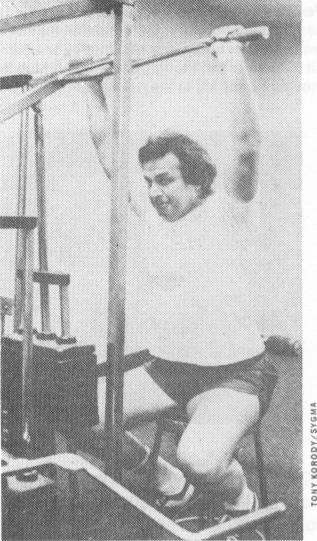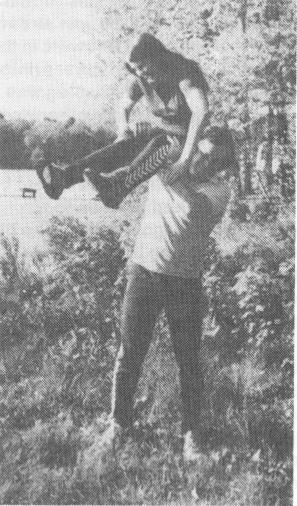| Previous | Index |
![]()
Ariel pumps Iron every day in his living room on the Universal exercise machine he helped develop in 1972.
moment on, Ariel was obsessed with exercise. "When I want something," he explains, "there is nothing else in life until I accomplish it."
Before leaving the kibbutz, Gideon vowed to become an Olympic champion in the discus. It was an arbitrary choice-he had never seen a discus thrown-but he pursued it with characteristic intensity, training eight hours a day according to a regimen he set out for himself. Later, at school, north of Tel Aviv, he received his first professional coaching, and set an Israeli discus record. At the 1960 Olympics in Rome, however, he found himself physically overmatched ("Genetically I wasn't cut out to be an Olympic champion") and utterly distracted by the world beyond Israel. Still, he was offered an athletic scholarship to the University of Wyoming. "The man tells me he is coach of the highest university in the U.S.," remembers Gideon. "I thought he meant academically, but it was altitude he was talking about."
Ariel put in his three years of compulsory military service in Israel, then headed for Wyoming in 1963. He spoke no English, had never seen television,
and was baffled by American football. "I saw the players for the first time and didn't know they wore shoulder pads," he remembers. "I thought these Americans were monsters." Despite the confusion, he flourished both academically and athletically. After graduation he enrolled briefly in medical school. "But after one semester," he says, "I decided I like to deal with health, not disease." Moving on to the University of Massachusetts, Gideon obtained a master's degree in exercise science in only nine months, then began work on his doctorate. In 1967 he met Dr. Wogrin's computers. "I got very excited," Gideon recalls. "I hate memorizing and this machine could do it for me. I started taking every course In computer science I could think of." When professors refused to credit the courses toward his degree, Ariel decided to go for two doctorates simultaneously-one in computers, the other In exercise science. "Dr. Wogrin told me, 'You are the first one who can quantify human movement,' " Gideon says. "He said, 'Keep going. It won't be easy. But you are going to revolutionize the field.' "
Though Ariel had been married in 1963 to an Israeli dancer and model named Yael, the relationship was doomed from the start. "It failed because I'm all day working," he says. "Family for me was never a success story." Now remarried, Yael lives
in California with Gideon's only child, Geffen Olympia, 14. Ariel's current girlfriend is Dr. Ann Penny, 35, a fellow computerphile who serves as president of CBA while he devotes himself to research and innovation. She harbors no illusions about Gideon's priorities. "His work is his life, his love," she observes with a sigh, "and I'm the same way. We never socialize." Each puts in up to 20-hour days at the laboratory, and diversion is limited to an afternoon run (five miles for him, 10 for her) and workouts at their tiny bungalow on nearby Lake Metacomet. Though CBA is worth an estimated $5 million, they live modestly on Ann's $2,500-a-month salary, while Gideon, the sole stockholder, plows all his own money back into the company.
Next year Ariel and Penny will move to Coto de Caza, Calif., where he and Braden are planning to open a
sports research center offering a wide variety of biomechanical services, ranging from physical rehabilitation to individual athletic instruction. If a frus
trated golfer, for instance, is anxious to add length to his tee shots, Ariel and Braden will be pleased to oblige. "If he doesn't increase his drive by, say, 15 yards," vows Gideon, "he won't pay. If he does, he pays about $1,500."
To help athletes arrive at their hidden potentials, Gideon is currently working on a computerized hydraulic exercise machine-similar in some respects to the Nautilus, which Ariel says he also helped develop-to be distributed by Wilson Sporting Goods. Meanwhile, Data General, the computer manufacturer, has donated equipment similar to Ariel's to the U.S. Olympic Committee, with the proviso that Gideon be in charge of its programming. Though Ariel cynically refers to the Games as the "pharmaceutical Olympics" ("The main thing now is how to take drugs and not get detected"), he plans to demonstrate once and for all that the key to better performance is biomechanics. To prove his point, he is working with four-time Olympic discus champ Al Oerter, 42, on his improbable quest for a fifth gold medal. "Physical deterioration," announces Gideon, his eyes sparkling with the gleam of a visionary, "will be overcome with scientific advance." JUDY KESSLER
For roommate and fellow workaholic Ann Penny, life with Ariel Is not fun and games.
"The business Is our hobby," she says.
PEOPLE September 1979


![]()
| Previous | Index |